Ashwagandha and Valerian: A Bedtime Combo for Deep Rest and Emotional Reset
🌿 Introduction: Why Sleep Is the Foundation of Resilience
In a world that glorifies productivity and constant motion, sleep has become one of our most underrated superpowers. Good sleep isn’t just about rest—it’s the time when your nervous system recalibrates, your hormones rebalance, and your emotions find stability.
But for many, deep and restorative sleep is hard to achieve. Chronic stress, racing thoughts, late-night screen time, and even caffeine intake can keep the brain overstimulated long after the body is tired. That’s where natural sleep allies like Ashwagandha and Valerian root come in. 🌙💤
Both herbs have centuries of traditional use—Ashwagandha in Ayurvedic medicine and Valerian in European herbalism—and modern science now supports their powerful synergy. When used together, they can help you fall asleep faster, stay asleep longer, and wake up calmer.
Let’s explore how this bedtime duo works, what the research says, and how to use them safely and effectively.
🌼 Part 1: Understanding Ashwagandha — The Adaptogen of Calm
🌿 What Is Ashwagandha?
Ashwagandha (Withania somnifera) is one of the most revered herbs in Ayurvedic medicine. Known as the “strength of the stallion,” it’s classified as an adaptogen—a natural substance that helps your body adapt to stress and restore internal balance.
Ashwagandha doesn’t sedate you like a sleeping pill. Instead, it reduces the body’s stress load, making it easier for your nervous system to enter a relaxed, sleep-ready state.
🧠 How Ashwagandha Supports Sleep
Ashwagandha influences several key systems involved in sleep regulation:
Reduces Cortisol Levels
Chronic stress keeps cortisol levels elevated, disrupting your sleep-wake rhythm.
Ashwagandha has been shown in multiple studies to reduce cortisol by up to 30%, helping the body transition from “fight or flight” to “rest and digest.”
Boosts GABA and Serotonin
These calming neurotransmitters are essential for mental quietness.
Ashwagandha gently enhances their activity, making it easier to wind down.
Balances the HPA Axis
Your hypothalamic-pituitary-adrenal (HPA) axis controls stress response.
When it’s overactivated, you feel anxious and wired. Ashwagandha brings it back to equilibrium.
Improves Sleep Quality (Not Just Quantity)
Clinical trials show that Ashwagandha improves sleep efficiency, onset latency, and mental clarity upon waking—a rare trifecta for a natural herb.
🌞 Daytime Benefits That Support Nighttime Calm
Ashwagandha doesn’t only act at night. Taking it during the day can improve:
Resilience to stress
Mental clarity and focus
Reduced anxiety and muscle tension
By keeping you calmer throughout the day, it prevents the build-up of stress that often sabotages your ability to fall asleep later.
🌸 Part 2: Understanding Valerian Root — The Herbal Sedative
🌱 What Is Valerian?
Valerian root (Valeriana officinalis) is a flowering plant native to Europe and Asia, used for centuries as a natural sleep aid. Unlike Ashwagandha, Valerian is a mild sedative herb, meaning it works directly on the nervous system to promote sleep.
Its nickname? “Nature’s Valium.” But unlike pharmaceutical sedatives, Valerian doesn’t alter your brain chemistry in a harsh way—it supports your natural sleep mechanisms.
🧬 How Valerian Promotes Deep Sleep
Valerian contains valerenic acid, isovaleric acid, and a range of volatile oils that work synergistically to relax the brain and body.
Here’s how it helps:
Enhances GABA Signaling 🧘
GABA (gamma-aminobutyric acid) is your brain’s main calming neurotransmitter.
Valerian increases GABA availability, reducing neural excitability and racing thoughts.
Shortens Sleep Onset 🕰️
Studies show Valerian can help people fall asleep 15–20 minutes faster on average.
Improves Sleep Continuity 🌙
Valerian may reduce nighttime awakenings and increase the proportion of deep sleep stages (slow-wave sleep).
Relieves Physical Tension 💆
The herb acts as a natural muscle relaxant, which is ideal if body tightness or restlessness keeps you awake.
⚖️ Gentle and Non-Addictive
Unlike prescription sleep medications, Valerian doesn’t cause morning grogginess, dependency, or rebound insomnia. It’s a gentle nervous system regulator, not a knockout agent.
🌿 Part 3: The Science Behind the Ashwagandha + Valerian Combo

💡 Why Combine Them?
Ashwagandha and Valerian work through complementary mechanisms:
Ashwagandha calms the stress response and reduces cortisol.
Valerian quiets the nervous system and prepares the mind for sleep.
Together, they form a holistic system:
Ashwagandha → addresses the cause (stress, anxiety, overstimulation).
Valerian → addresses the symptom (difficulty falling asleep).
This makes them ideal for people whose insomnia stems from mental stress, emotional overthinking, or nervous energy.
📚 What Research Says
A 2020 randomized controlled trial found that Ashwagandha significantly improved both sleep quality and sleep onset latency in participants with insomnia symptoms.
Valerian’s effects have been validated across dozens of studies, particularly for improving sleep onset and subjective sleep satisfaction.
Combined herbal formulas containing both have shown synergistic effects—users report deeper sleep and better next-day alertness than with either herb alone.
Though more research is needed on their combination, the mechanistic logic is strong and the safety profile is excellent for most people.
🕯️ Part 4: How to Use Ashwagandha and Valerian Together
🌙 Timing Matters
Ashwagandha: Can be taken morning or evening depending on your goal.
For stress support, take it in the morning.
For sleep support, take it 30–60 minutes before bed.
Valerian: Works best when taken 30–90 minutes before bedtime.
💡 Tip: You can take Ashwagandha earlier in the evening and Valerian right before bed for a smoother transition into sleep.
💊 Dosage Guidelines
| Supplement | Typical Dose | Notes |
|---|---|---|
| Ashwagandha root extract | 300–600 mg | Choose KSM-66® or Sensoril® extracts for consistency |
| Valerian root extract | 400–900 mg | Start low and increase as needed |
| Ashwagandha powder (churna) | 1–2 tsp in warm milk | Traditional Ayurvedic use before bedtime |
| Valerian tea | 1–2 tsp dried root steeped for 10–15 minutes | Add honey or chamomile for flavor |
⚠️ Always consult your healthcare provider if you’re pregnant, breastfeeding, or taking medication (especially antidepressants or sedatives).
🍵 Bedtime Ritual Example
Step 1: Dim the lights an hour before bed.
Step 2: Brew a cup of valerian tea.
Step 3: Take your ashwagandha capsule.
Step 4: Practice 5 minutes of deep breathing (4-7-8 technique).
Step 5: Reflect or journal one positive moment from the day.
Within 20–30 minutes, you’ll likely feel your mind quieting and your body softening into readiness for sleep. 🌘
🌬️ Part 5: The Nervous System Connection
Sleep doesn’t happen in isolation—it’s deeply tied to your autonomic nervous system (ANS), which governs stress and relaxation.
The sympathetic system = alert, active, fight-or-flight.
The parasympathetic system = calm, restorative, rest-and-digest.
Ashwagandha helps reduce overactivation of the sympathetic system (stress response).
Valerian enhances the parasympathetic tone (relaxation).
When both systems work harmoniously, you feel balanced—alert when needed, and deeply calm when it’s time to rest. 🌿🧘
💖 Part 6: Emotional and Mental Health Benefits
🌸 Less Anxiety and Rumination
Ashwagandha’s adaptogenic effects help regulate serotonin and dopamine, which stabilizes mood. Valerian, through its GABAergic action, quiets mental chatter.
Together, they reduce overthinking and emotional reactivity, making them valuable not just for sleep but for overall emotional resilience.
🧘 Better Stress Recovery
Chronic stress drains magnesium, B-vitamins, and neurotransmitter balance—creating a loop of fatigue and insomnia. By supporting cortisol balance and GABA activity, this combo helps break that stress-insomnia cycle.
🌤️ Next-Day Calm Energy
Unlike sleeping pills that can leave you foggy, Ashwagandha and Valerian promote restorative sleep, leading to clear morning focus and steady energy. Users often describe waking up “refreshed, not sedated.”
🍯 Part 7: Stacking with Other Calming Nutrients
For an even stronger bedtime ritual, consider layering this duo with other gentle supports:
Magnesium glycinate: enhances GABA and muscle relaxation 💪
L-theanine: smooths brainwave transitions into alpha/theta (relaxation)
Chamomile or lavender: aromatherapy or tea adds soothing synergy 🌸
Glycine: supports body temperature regulation for deeper sleep
But remember—start simple. Test the Ashwagandha + Valerian combo first for 2–3 weeks before adding extras.
🌿 Part 8: Common Questions
❓Can I Take Ashwagandha and Valerian Every Night?
Yes, both can be taken nightly for several weeks or months. Many users find they can cycle off after their sleep patterns stabilize.
❓Will It Make Me Drowsy During the Day?
Unlikely. Ashwagandha tends to improve daytime energy while reducing overactivation. Valerian’s effects fade by morning, leaving you calm but alert.
❓Can I Take It with Melatonin?
Yes, but start with lower doses of melatonin (0.5–1 mg). Too much melatonin can disrupt your circadian rhythm or cause vivid dreams.
❓Are There Any Side Effects?
Both herbs are well tolerated. Possible mild effects:
Ashwagandha: mild stomach upset or vivid dreams (rare)
Valerian: mild grogginess in some users if taken too late
Avoid alcohol and heavy meals close to bedtime for best results.
🧭 Part 9: Creating a Holistic Nighttime Routine
Herbs alone can’t undo a chaotic nighttime lifestyle. Combine them with these behavioral and sensory cues for maximum effect:
🕯️ Light & Environment
Dim screens and lights an hour before bed.
Use warm-colored lamps or candles to trigger melatonin release.
🌬️ Breath & Body
Try box breathing (4-4-4-4) or body scanning before sleep.
Gentle stretching releases muscular tension.
🛏️ Sensory Comfort
Keep your bedroom cool, dark, and quiet.
Add calming scents like lavender or sandalwood.
📵 Mental Unplug
No news or social media before bed.
Replace scrolling with journaling or gratitude reflection.
Combined with Ashwagandha and Valerian, these habits form a resilience-restoration system that trains your brain to associate bedtime with safety and peace.
🌌 Part 10: A Week of Better Sleep — Practical Guide

Here’s a simple 7-day plan to test the combo effectively:
| Day | Focus | Practice |
|---|---|---|
| 1 | Preparation | Set bedtime 30 min earlier. Add valerian tea. |
| 2 | Add Ashwagandha | 300 mg before dinner. |
| 3 | Breathwork | Add 5-min 4-7-8 breathing before bed. |
| 4 | Digital Detox | No screens 60 min before sleep. |
| 5 | Mind Check | Journal one gratitude entry. |
| 6 | Optimize Room | Cool temp (18–20°C), dim lighting. |
| 7 | Reflection | Note improvements in mood, energy, and rest. |
Most people report noticeable differences in sleep onset, mood stability, and next-day energy within a week. 🌙✨
🌈 Part 11: Who Should Avoid or Use with Caution
Pregnant or breastfeeding women (limited data on safety)
People on thyroid medication (Ashwagandha may increase thyroid activity)
Those on sedatives or antidepressants (Valerian may enhance effects)
Before surgery: discontinue at least 2 weeks prior
Always consult a professional before combining with medications.
💬 Part 12: Real-World Experiences
Many users describe the Ashwagandha + Valerian combo as a “reset button for the nervous system.”
“I used to lie awake for hours with racing thoughts. Now, 30 minutes after taking both, my body just melts into the pillow.”
— Sophie, 35, MS patient managing chronic fatigue
“It’s not just sleep—it’s peace. I wake up lighter, not groggy.”
— Marco, 42, entrepreneur recovering from burnout
These experiences are anecdotal but echo what the research suggests: natural restoration through gentle regulation, not sedation.
🌠 Conclusion: A Bedtime Partnership for Mind-Body Harmony
When modern stress meets ancient wisdom, healing happens. 🌿
Ashwagandha and Valerian form one of the most effective natural combinations for deep rest, targeting both the root cause (stress) and the symptom (insomnia).
By integrating them into a nightly ritual—with calm lighting, slow breathing, and mindful awareness—you create not just better sleep but a more resilient nervous system.
Every night becomes an act of self-repair. Every morning, a renewal of strength. ✨
📚 References
Langade, D. et al. “Efficacy and Safety of Ashwagandha Root Extract in Insomnia and Anxiety.” Cureus, 2020.
Chandrasekhar, K. et al. “A Prospective Study on the Effects of Ashwagandha in Stress and Anxiety.” Indian Journal of Psychological Medicine, 2012.
Bent, S. et al. “Valerian for Sleep: A Systematic Review.” American Journal of Medicine, 2006.
Fernandez-San-Martin, M. I. et al. “Valerian for Sleep: Meta-analysis of Randomized Trials.” Sleep Medicine, 2010.
Lopresti, A. L. et al. “Adaptogens in Stress Management.” Phytotherapy Research, 2019.
Huberman, A. “Tools for Sleep Optimization.” Huberman Lab Podcast, 2023.
National Center for Complementary and Integrative Health (NCCIH). “Valerian and Sleep Disorders.” 2021.
WHO Monographs on Selected Medicinal Plants: Valeriana officinalis and Withania somnifera, 2019.
Related Posts
-

Nootropics That Promote Calm and Rest
Explore the world of calming nootropics — natural brain enhancers that promote relaxation, better focus, and deeper rest. Learn how L-Theanine, magnesium, ashwagandha, and other adaptogens help balance your nervous system, reduce stress, and support restorative sleep.
-

Best Natural Supplement Stack for Sleep
Discover the best natural supplement stack for deep, restorative sleep. Learn how nutrients like magnesium, L-theanine, glycine, and calming herbs such as chamomile and ashwagandha work together to relax your body, calm your mind, and improve sleep quality—naturally and safely.
-

Combining L-Theanine and Magnesium for Sleep: A Calm Night, Naturally
Discover how combining L-Theanine and Magnesium can help you drift into deep, restorative sleep. Learn how this natural duo calms the mind, relaxes the body, and supports your nervous system—without grogginess the next morning.
-

How to Sleep Better After Intense Workouts
Struggling to fall asleep after a tough workout? Learn how to optimize your post-training recovery with nutrition, hydration, and science-backed sleep strategies. Discover how to calm your nervous system, balance hormones, and wake up fully recharged for your next session.
-

How to Create a Resilience-Boosting Diet
Discover how to build emotional and physical strength from the inside out with a resilience-boosting diet 🍎. Learn which foods stabilize your mood, how supplements like magnesium and omega-3s strengthen your stress response, and why pairing nutrition with breathwork and therapy creates lasting calm, focus, and vitality 🌿💪.
-

Best Teas and Herbal Blends for Calmness: Nature’s Way to Restore Inner Peace
Ashwagandha, the ancient adaptogenic herb, helps your body find balance during stress. Known as “Indian ginseng,” it supports cortisol regulation, boosts energy, and restores calm clarity. Discover how this powerful root promotes resilience, emotional balance, and steady vitality — one cup at a time. 🌸
-

Parenting and Emotional Strength: How to Raise Children Without Losing Yourself
Empathy is the bridge that connects hearts — the quiet power to understand, feel, and support another’s emotions without judgment. Learn how empathy strengthens relationships, enhances communication, and cultivates deeper compassion in everyday life. 🌿
-

How to Bounce Back from Public Failure: Reclaiming Confidence, Purpose, and Power
Visualization is more than imagination — it’s brain training for resilience. By picturing calm, success, or healing, you activate the same neural pathways as real experience. Learn how daily visualization rewires your brain for confidence, emotional balance, and recovery from stress. ✨
-

Coping with Financial Stress Through Resilience: How to Stay Grounded When Money Feels Tight
Body awareness is the foundation of emotional resilience. By tuning into your body’s signals — tension, fatigue, or calm — you learn to recognize stress before it overwhelms you. Discover how mindfulness, gentle movement, and breathwork can deepen your connection with your body and restore balance from the inside out. 🧘
-

How to Stay Positive During Chronic Illness: A Guide to Emotional Strength and Hope
Creativity is more than art — it’s a form of healing. Whether through painting, writing, music, or small acts of expression, creativity helps release emotion, calm the nervous system, and reconnect you to joy. Discover how to use creativity as a tool for emotional balance, resilience, and self-discovery. 🌿
-

Resilience Tips for Caregivers: How to Stay Strong While Caring for Others
Joy isn’t the absence of pain — it’s the quiet strength to find light even in challenging times. Cultivating joy through small daily moments restores balance, releases stress, and reminds you of life’s beauty. Learn how to reconnect with authentic happiness, rebuild emotional energy, and nurture your nervous system through gratitude, presence, and play. 🌿
-

Building Resilience After a Breakup: How to Heal, Rebuild, and Rise Stronger
Social connection is one of the strongest predictors of emotional resilience. During difficult times, genuine relationships act as anchors — calming the nervous system, reducing stress hormones, and helping you regain perspective. Learn how cultivating real human connection can strengthen your mind, heart, and overall well-being. 🌿
-

How to Stay Emotionally Strong During Job Loss
Your emotions are powered by brain chemistry — a delicate balance of neurotransmitters like serotonin, dopamine, and cortisol. When these chemicals work in harmony, you feel calm, focused, and resilient. Learn how daily habits, nutrition, and mindfulness can support your brain chemistry and boost emotional well-being naturally. 🌿
-

The Role of Hormones in Emotional Stability: How Your Chemistry Shapes Your Calm
Hormones shape more than your body — they shape your emotions, resilience, and sense of calm. From cortisol to serotonin, these chemical messengers influence how you react to stress, connect with others, and recover from challenges. Learn how to balance your hormones naturally to build lasting emotional stability and harmony within. 💫
-

Mitochondria and Emotional Energy: The Cellular Power Behind Your Mood
Breathwork is one of the most powerful tools for emotional regulation and cellular balance. Through intentional breathing, you can calm your nervous system, increase oxygen flow to the brain, and even support mitochondrial energy. Learn how conscious breathing connects body and mind — transforming stress into presence and emotional strength. 🌿
-

Inflammation and Its Impact on Mood Resilience: The Silent Link Between Body and Mind
Inflammation doesn’t just affect the body — it impacts the mind. Chronic inflammation alters brain chemistry, depletes serotonin, and makes emotional recovery harder. Learn how calming inflammation through nutrition, mindfulness, and sleep can restore balance, resilience, and a renewed sense of emotional strength. 💫
-

How Antioxidants Protect Emotional Well-being: The Hidden Link Between Oxidative Stress and Mental Health
Antioxidants do more than protect your body — they defend your mind. By neutralizing oxidative stress, antioxidants support serotonin, dopamine, and brain energy pathways that keep you calm, focused, and emotionally balanced. Discover how foods like berries, green tea, and dark chocolate nourish your brain, boost mood, and strengthen resilience from the inside out. 🌿✨
-

The HPA Axis and Emotional Health: The Hidden Bridge Between Stress and Mind
Neuroplasticity — the brain’s ability to rewire and adapt — is the foundation of emotional healing and resilience. When you face stress, trauma, or change, your neural pathways can reshape themselves to support new patterns of calm, focus, and self-awareness. Learn how daily practices like mindfulness, therapy, and breathwork strengthen neuroplasticity to transform emotional pain into personal growth. 🌸
-

Why Cortisol Control Is Key to Resilience: Mastering Stress to Build Emotional Strength
Controlling cortisol — the body’s main stress hormone — is the secret to lasting resilience. When cortisol levels stay balanced, your mind becomes clearer, emotions steadier, and energy more sustainable. Learn how breathwork, mindset shifts, adaptogens, and daily rhythms can help you calm your stress response and build true inner strength. 🌞💪
-

Dopamine’s Influence on Motivation and Recovery: Reigniting Drive and Balance
Healthy relationships are the foundation of emotional balance and resilience. Whether romantic, familial, or platonic, genuine connection releases dopamine, serotonin, and oxytocin — the brain’s “bonding trio” — helping us feel secure, motivated, and seen. Learn how trust, empathy, and communication not only strengthen your connections but also reshape your nervous system for deeper emotional well-being. 🌿🤝
-

The Role of Serotonin in Resilience: How This “Mood Molecule” Shapes Emotional Strength
Serotonin — often called the “resilience molecule” — plays a vital role in how we handle stress, regulate mood, and recover from emotional challenges. Beyond happiness, this powerful neurotransmitter helps balance the gut-brain axis, stabilize the nervous system, and support emotional flexibility. Learn how nutrition, sunlight, mindfulness, and adaptogens can naturally boost serotonin and strengthen your emotional resilience. 🌞🧠
-

How Neuroplasticity Supports Emotional Growth: Rewiring the Brain for Resilience
Neuroplasticity is the brain’s built-in power to grow, adapt, and heal — and it’s the foundation of emotional transformation. Every mindful breath, compassionate act, or reframed thought strengthens new neural pathways that support resilience and self-awareness. Learn how your brain rewires through daily habits, helping you turn emotional challenges into opportunities for growth and calm. 🌿
-

Tai Chi and Adaptogens for Mind-Body Balance: The Art of Harmonizing Energy and Resilience
Alchemy isn’t just an ancient science — it’s a timeless symbol of transformation and inner balance. By blending the physical and spiritual, alchemy teaches us that change begins from within. Just as metals are refined into gold, we too can transmute emotional pain, stress, and chaos into clarity and strength through mindful practice and self-awareness. 🌙✨
-

Cold Therapy and Emotional Control: Training the Mind Through the Body
Cold therapy isn’t just for athletes — it’s a tool for emotional mastery. By exposing your body to controlled cold, you train your nervous system to stay calm under stress, improving focus, mood, and resilience. This article explores the science of cold exposure, its impact on hormones and the vagus nerve, and how ice baths and cold showers can help you build emotional control, one breath at a time. 🧊🧘♂️
-

How Music Influences Emotional Recovery: The Healing Soundtrack of the Mind
Neuroplasticity — the brain’s ability to rewire and heal itself — is at the heart of emotional recovery. Through mindful habits, music, therapy, and consistent mental stimulation, your brain can form new connections that support resilience and well-being. Discover how neuroplasticity turns pain into growth, helping you rebuild balance, focus, and emotional strength. 🌿
-

Nature Therapy for Building Resilience: Reconnecting With the Healing Power of the Earth
Nature therapy helps rebuild emotional resilience by reconnecting you with the healing rhythms of the Earth. From forest walks to sunlight exposure, nature restores balance to your nervous system, lowers stress hormones, and teaches emotional adaptability. Learn how spending time outdoors can enhance mental clarity, calm anxiety, and awaken your natural capacity to heal. 🌞
-

Breathwork Techniques That Pair with Supplements: The Ultimate Synergy for Stress Relief and Mental Clarity
Breathwork and supplements create a powerful mind-body synergy for stress relief, focus, and energy. By combining intentional breathing with adaptogens, nootropics, and calming nutrients, you can naturally regulate cortisol, sharpen mental clarity, and boost emotional balance. This guide explores the best breathwork techniques and supplement pairings to help you feel centered, calm, and energized from the inside out. 🌿
-

Why Cortisol Balance Matters for Emotional Strength
Balancing cortisol — your body’s main stress hormone — is essential for emotional resilience. When cortisol is chronically high, your mind stays stuck in survival mode, leading to fatigue, anxiety, and emotional instability. This article explores how nutrition, supplements, breathwork, and therapy can help restore healthy cortisol rhythms, regulate the nervous system, and strengthen your ability to handle life’s challenges with calm focus and emotional strength. 🌿
-

Best Supplements for Students During Exam Season: Focus, Energy, and Memory Support
Studying late into the night? Learn which natural supplements can boost focus, memory, and mental stamina during exam season — without the crash. From omega-3s to Bacopa and Rhodiola, discover your brain’s ultimate exam support stack. 🎓🧠
-

Natural Memory Boosters for Seniors: How to Keep Your Mind Sharp and Focused
Stay mentally sharp and confident as you age. Discover science-backed natural supplements and lifestyle habits that boost memory, focus, and brain longevity for seniors. 🌿🧠
-

The Link Between Stress, Cortisol, and Memory Loss
Chronic stress can quietly erode your memory — and cortisol is the key culprit. Learn how stress hormones affect the brain, why the hippocampus shrinks under pressure, and how natural strategies can help you restore memory and mental clarity. 🧠✨
-

How to Build a Daily Supplement Routine for Memory Health
Want to sharpen your memory and stay mentally clear? Learn how to build a daily supplement routine for memory health — from morning focus to nighttime brain repair. Discover science-backed nutrients that boost recall, focus, and long-term cognitive resilience. 🧠🌿
-

Top 5 Natural Supplements for Memory Recall and Focus
Looking to boost memory and concentration naturally? Discover the top 5 supplements — Bacopa, Ginkgo Biloba, Lion’s Mane, Rhodiola, and Phosphatidylserine — that enhance focus, recall, and long-term brain health. 🧠✨
-

Top Supplements to Balance Mood Naturally
From omega-3s to adaptogens, discover the top natural supplements proven to support emotional balance, reduce stress, and promote inner calm — safely and effectively. 🌿✨
-
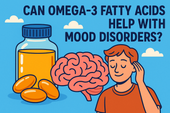
Can Omega-3 Fatty Acids Help with Mood Disorders?
Omega-3 fatty acids do more than support heart health — they can help balance mood, reduce depression, and calm anxiety. Discover how EPA and DHA nourish your brain, fight inflammation, and support emotional well-being from within. 🌊🧠
-

Vitamin D and Mood: The Sunshine Vitamin for Emotional Balance
Could the key to emotional balance be as simple as a little sunlight? Discover how vitamin D — the sunshine vitamin — influences serotonin, reduces inflammation, and helps you feel more positive and resilient year-round. ☀️💛
-

The Role of Magnesium in Reducing Irritability and Low Mood
Feeling on edge or emotionally drained? Magnesium could be the missing link between your body and your mood. Discover how this essential mineral reduces irritability, balances neurotransmitters, and helps your nervous system find calm again. 🌿✨
-
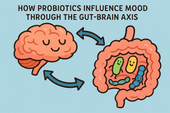
How Probiotics Influence Mood Through the Gut-Brain Axis
Discover how probiotics can do more than support your digestion—they can actually uplift your mood. This article explores the fascinating gut-brain axis and how balancing your gut bacteria through probiotics may help reduce anxiety, improve emotional stability, and support long-term mental well-being. 🌿🧠
-
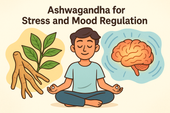
Ashwagandha for Stress and Mood Regulation
Discover how Ashwagandha, the powerful adaptogenic herb 🌿, helps your body manage stress and regulate mood. Learn how it balances cortisol, boosts GABA and serotonin, and supports emotional stability — helping you feel calm, focused, and resilient every day.
-
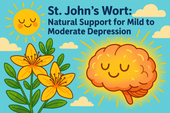
St. John’s Wort: Natural Support for Mild to Moderate Depression
Discover how St. John’s Wort, the “sunshine herb” 🌼, naturally supports mild to moderate depression. Learn how it boosts serotonin, balances mood, and promotes emotional resilience — with research showing its effectiveness compares to antidepressants, but with fewer side effects.
-
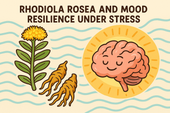
Rhodiola Rosea and Mood Resilience Under Stress
Discover how Rhodiola rosea helps your body adapt to stress 🌿. Learn how this powerful adaptogen balances cortisol, supports serotonin and dopamine, and strengthens emotional resilience — helping you stay calm, focused, and energized under pressure.
-
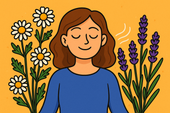
Chamomile and Lavender: Herbal Calm for Emotional Fluctuations
Discover how chamomile and lavender bring calm to emotional ups and downs 🌿. Learn how these two soothing herbs balance your nervous system, ease anxiety, and support restful sleep — naturally helping you find peace and emotional stability.
-
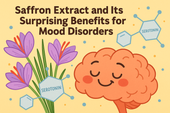
Saffron Extract and Its Surprising Benefits for Mood Disorders
Discover how saffron extract — the golden spice of joy 🌸 — can naturally support mood balance, ease anxiety, and lift mild depression. Learn what science says about its serotonin-boosting power, the ideal dosage, and how this ancient remedy compares to modern antidepressants.
-
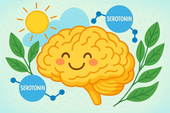
5-HTP and Serotonin: A Natural Path to Lifting Mood
Discover how 5-HTP naturally boosts serotonin 🌞 — the neurotransmitter behind mood, sleep, and emotional balance. Learn how this plant-derived compound supports happiness, reduces anxiety, and improves rest by helping your brain create more serotonin the gentle, natural way.
-
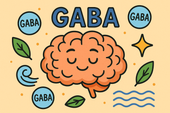
GABA Supplements for Reducing Anxiety and Mood Swings
Discover how GABA supplements can help reduce anxiety and balance mood naturally 🌿. Learn how this calming neurotransmitter works to quiet the mind, ease stress, and improve sleep — plus which nutrients and habits can boost your body’s own GABA production for long-term emotional stability.
-
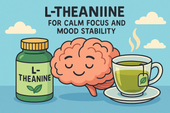
L-Theanine for Calm Focus and Mood Stability
Discover how L-theanine, the calming compound found in green tea 🍵, promotes focus, relaxation, and mood stability. Learn the science behind how it balances neurotransmitters, reduces stress hormones, and enhances clarity — helping you stay centered, calm, and productive without sedation.
-
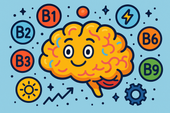
B Vitamins and Brain Chemistry: Supporting Energy and Emotional Balance
Discover how B vitamins power your brain chemistry ⚡. Learn how B6, B9, and B12 support serotonin, dopamine, and energy production — helping boost focus, mood, and emotional balance. From diet to supplements, explore how this vital nutrient group keeps your mind resilient and your energy steady.
-

N-Acetyl Cysteine (NAC) and Mood Disorders: What the Research Says
Learn how N-Acetyl Cysteine (NAC) supports brain health and mood balance 🧠. Discover how this antioxidant helps reduce oxidative stress, regulate glutamate, and improve emotional stability in depression, bipolar disorder, and anxiety — backed by cutting-edge psychiatric research.
-

Supplements for Bipolar Disorder: What May Support Stability
Discover the best supplements for bipolar disorder 🌿 that may support emotional stability and brain health. Learn how nutrients like omega-3s, magnesium, vitamin D, and NAC can help reduce inflammation, balance neurotransmitters, and complement traditional treatment safely.

















































